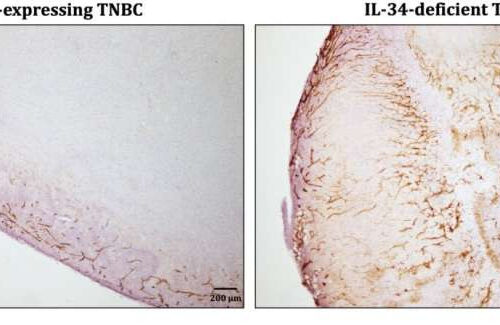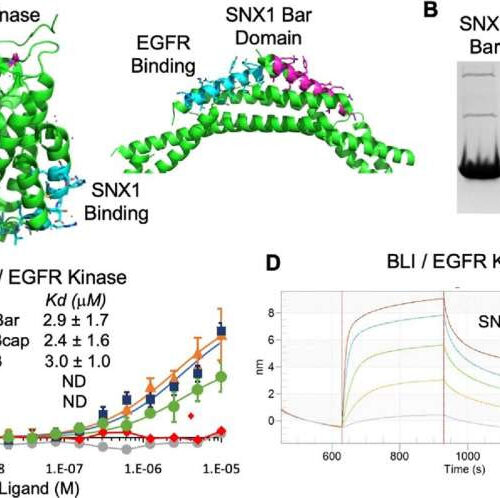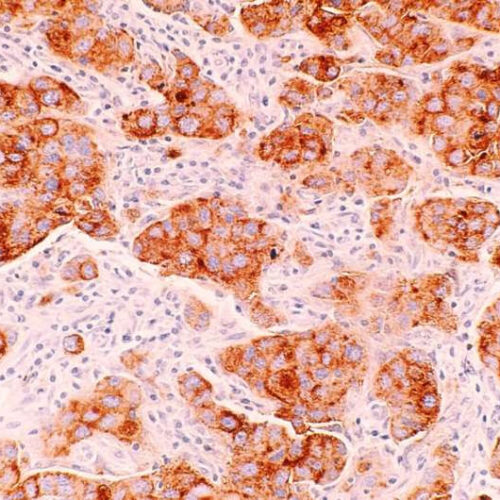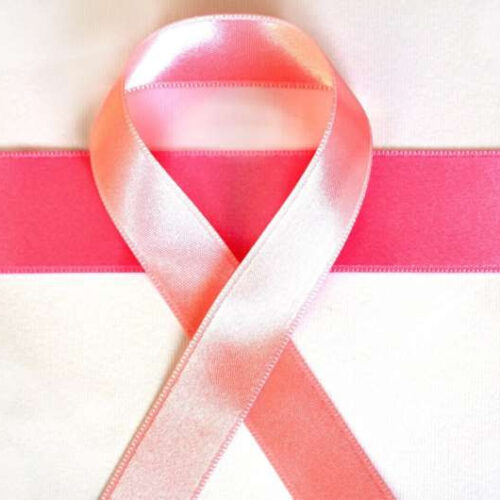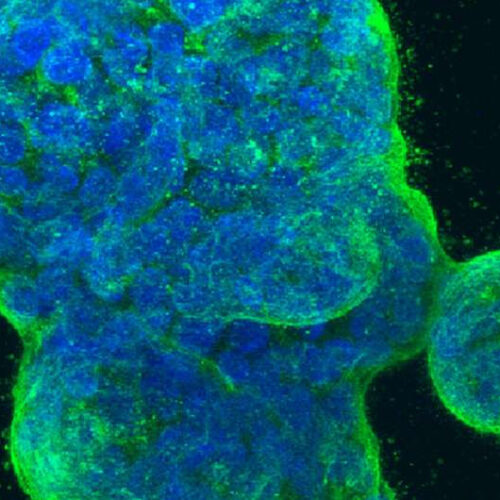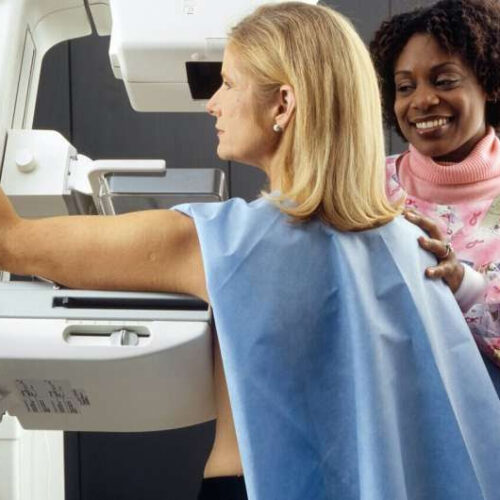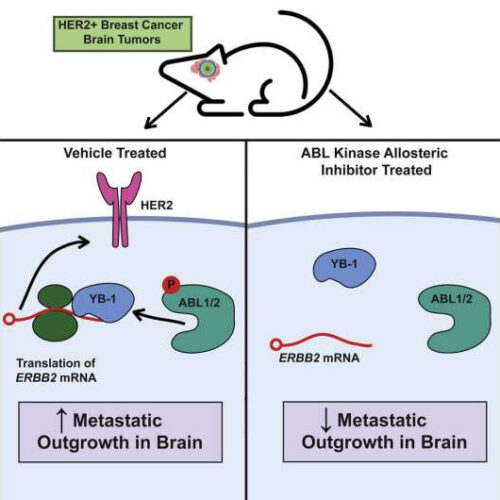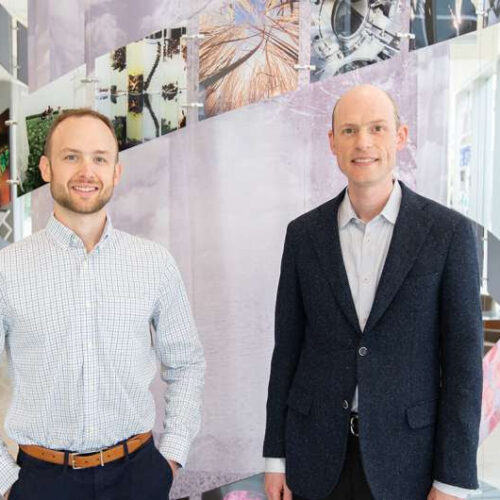by Hokkaido University In IL-34-expressing tumors, blood vessels were observed only in the outer layer, whereas in IL-34-deficient tumors, blood vessels were observed in the whole area (modified from Nabeel Kajihara, et al. Cancer Immunology, Immunotherapy. September 14, 2022) Credit: Nabeel Kajihara, et al. Cancer Immunology, Immunotherapy. September 14, 2022 Triple-negative breast cancer (TNBC) tumors...
Tag: <span>Breast Cancer</span>
Researchers develop ‘Goldilocks drug’ to treat triple-negative breast cancer
by Mikayla Mace Kelley, University of Arizona cSNX1.3 competitively inhibits binding of EGFR to SNX1. A Ribbon drawing of EGFR kinase domain (PDB ID 5CNO) and SNX1 Bar domain (PDB ID 4FZS). The proposed SNX1 binding site is well away from the kinase active site. B SDS page gels for purified SNX1 Bar domain (residues 301–522) and EGFR kinase...
Scientists pinpoint druggable target in aggressive breast cancer
by Blake Belden, Virginia Commonwealth University Credit: Unsplash/CC0 Public Domain Researchers at VCU Massey Cancer Center have set their sights on a new therapeutic target for an aggressive form of breast cancer with limited treatment options. Breast cancer is the second most common cancer in U.S. women, and triple-negative breast cancer(TNBC) is a more aggressive and...
Novel drug target for triple-negative breast cancer discovered
Reviewed by Emily Henderson, B.Sc. Oct 17 2022 Research led by Dr. Suresh Alahari, Professor of Biochemistry at LSU Health New Orleans’ Schools of Medicine and Graduate Studies, reports a combination of a novel small inhibitory molecule and an FDA-approved chemotherapy drug suppresses the growth of triple-negative breast cancer cells synergistically. The findings are published...
Long-term study supports link between inflammation and cognitive problems in older breast cancer survivors
by University of California, Los Angeles Credit: Pixabay/CC0 Public Domain Scientists are still trying to understand why many breast cancer survivors experience troubling cognitive problems for years after treatment. Inflammation is one possible culprit. A new long-term study of older breast cancer survivors published today in the Journal of Clinical Oncologyand co-led by UCLA researchers adds important...
Next-generation liquid biopsy detects nano-sized signs of breast cancer in early-stage patients
by Emily Gersema, University of Southern California Three-dimensional culture of human breast cancer cells, with DNA stained blue and a protein in the cell surface membrane stained green. Credit: NCI Center for Cancer Research, National Cancer Institute, National Institutes of Health A USC-led team of scientists has found indications that a special blood test called...
Aggressive breast cancer linked to African ancestry
by Jane Langille, Cornell University Credit: Pixabay/CC0 Public Domain Weill Cornell Medicine investigators have identified definitive biological links between African ancestry and disease processes that affect an aggressive cancer type called triple-negative breast cancer (TNBC). Their analysis of TNBC tumors from a diverse patient population yielded a large set of genes whose expression differed in patients...
Scientists develop new ultrasound technique for earlier detection and diagnosis of breast cancer
by National Physical Laboratory Credit: Unsplash/CC0 Public Domain Scientists at the UK’s National Physical Laboratory (NPL) have demonstrated the first in-person measurements of breast tissue using an innovative new detection technique, which has the potential to significantly improve breast cancer outcomes by aiding in the earlier diagnosis and treatment of the disease. The technique works...
Leukemia drug shows potential against metastatic HER2-positive breast cancer
by Sarah Avery, Duke University Graphical abstract. Credit: Cell Reports (2022). DOI: 10.1016/j.celrep.2022.111268 In animal studies led by researchers at Duke Cancer Institute, a drug approved to treat leukemia successfully disrupted the ability of HER2-positive breast cancer tumors from colonizing the brain. The finding, appearing online Aug. 30 in the journal Cell Reports, provides evidence for human trials and...
New therapeutic target identified for triple-negative breast cancer
by Ananya Sen, University of Illinois at Urbana-Champaign Adam Nelczyk, left, and Erik Nelson have discovered that the nuclear receptor TLX can potentially be used to treat triple-negative breast cancer. Credit: Julia Pollack Adam Nelczyk, left, and Erik Nelson have discovered that the nuclear receptor TLX can potentially be used to treat triple-negative breast cancer....

